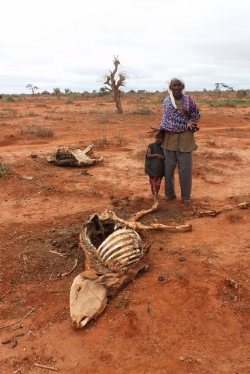 The drought began about a year ago with the last rains falling in autumn 2010. One cause of the drought is the climatic effect of La Nina phenomenon. La Nina drives away moisture, leaving drought and hardship in its path. Little evaporation means lack of rain, and thus begins the downward spiral of suffering.
The drought began about a year ago with the last rains falling in autumn 2010. One cause of the drought is the climatic effect of La Nina phenomenon. La Nina drives away moisture, leaving drought and hardship in its path. Little evaporation means lack of rain, and thus begins the downward spiral of suffering.
Dahlen, a farmer says: “All I see is dry barren fields. Even the weeds haven’t grown”. His crops are dead after the driest nine months since the big drought of 1953. And it is not only the farmers who are suffering in this current drought. Herds of cattle are shrinking as pastoralists sell off calves and breeding stock which they can no longer afford to feed.
Sounds like another report on the situation in East Africa, doesn’t it? You might be surprised to learn that these are extracts from a report on the terrible drought that is crippling farming in southern United States. The above facts are cited from an article in the Financial Times by Gregory Meyer, published on 18 July 2011.
Nothing to fall back on
Dahlen Hancock, a cotton farmer in Texas planted 3,000 acres of his 5,800 acre land. It did not germinate. I think Kabeto Eduso in East Africa would empathise with you Mr Hancock; his seed didn’t germinate either.
Kabeto is 62 years old and lives in Ethiopia. This year, he planted only two acres of his 4.5 acre land because his harvest failed last season and he did not have enough seed. Because of the drought, the plants are weak and Kabeto feels that he won’t have a harvest this year either. This means that his crop has failed for the second time in a row.
Unlike Dahlen, Kabeto does not have any irrigated land, no farmers co-op down the road, no government farm subsidies and no insurance to fall back on.
George Enloe is a cattle broker in Texas and he is suffering from reduced income caused by the drought in the southern United States. Halake Gimbe, a cattle farmer in Ethopia is left with only four of his forty cows. He used to sell up to seven cups of milk a day. Now there is no milk and therefore no income. Halake’s family is forced to collect firewood and make charcoal in order to survive.
Enloe and Halake are both facing the terrible effects drought has on their respective livelihoods. I suspect Enloe’s recovery from the crisis will be quicker than Halake’s who has already resorted to an alternate livelihood to survive.
Different worlds but same impact
Two droughts in two very different parts of the world, but the impact and suffering are similar and different in many ways. What is glaringly different is the protection and coping mechanisms of farmers in these regions.
The United States Department of Agriculture (USDA) has declared most of Texas a primary disaster area. This means that farmers in the Texas disaster zone will be eligible for emergency benefits, in other words AID.
I wonder if The Times Newspaper’s Africa correspondent Jonathan Clayton will be accusing the USDA of crying wolf in Texas.
Why aid agencies aren’t crying wolf
The Financial Times reports that in 2010 the US had a bumper cotton crop. In the US, the situation goes from bumper crop to drought in one season and the USDA declares a disaster (I don’t disagree with the decision).
East Africa, with more than two years of consecutive drought is in a much worse situation. Farmers have lost everything, livestock are dying in their thousands and people are on the move in an attempt to survive and Jonathan Clayton says aid agencies are crying wolf!
Let’s not forget that farmers in the US are supported by subsidies, they can insure their crops and benefit from government aid.
After one season of drought, farmers in the US can expect to receive aid from the US government. While their counterparts in East Africa hope for aid and pray that it doesn’t come too late.
I am interested to understand why Jonathan Clayton accuses aid agencies of crying wolf with respect to the drought in East Africa but is silent on the declared disaster and aid to farmers in the US?
Makes you think, doesn’t it?
Read for about the drought in Ethiopia
HelpAge’s work is supported by our sister organisation Age UK. Please donate to Age UK’s East Africa appeal for vulnerable older people affected by the devastating drought in Ethiopia.
Age UK is raising money together with the Disasters Emergency Committee (DEC) for the East Africa Crisis Appeal. The DEC is a consortium of 14 aid agencies working together in times of disasters and emergencies.
